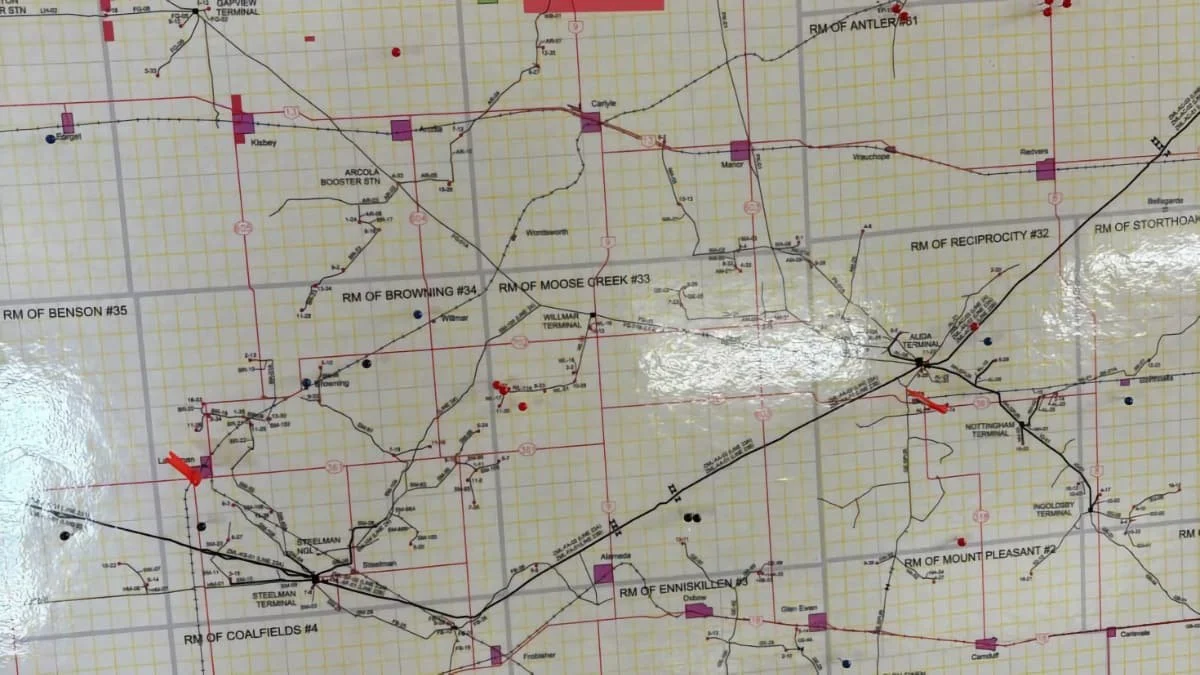Numerous service rigs are being targeted for theft in Alida-Lampman area of SE Sask
By Brian Zinchuk
Seven service rig companies based and operating in southeast Saskatchewan are increasingly alarmed at a growing number of thefts and damage to their equipment when it is in the field.
They’re working with the local RCMP, but the problem is frustrating, and costly, in both time and money.
The companies included Red Hawk Well Servicing of Oxbow, Certified Energy Services of Estevan, Southern Range Well Servicing of Weyburn, Mayco Well Servicing of Oxbow, Ryder Well Servicing of Weyburn, and Independent Well Servicing of Estevan. Sun Country Well Servicing of Estevan, Ex-Cel Well Servicing of Oxbow, Eagle Sky Ventures and General Well Servicing of Carnduff are also part of the group, but were unable to attend the meeting.
Some companies have been hit multiple times. It’s impacted the smallest to largest companies.
Management or owners of those companies got together in Estevan on July 17 to once again discuss the matter with Sgt. Steve Ross, detachment commander of the Estevan RCMP, and Pipeline Online.
That detachment works in concert with Carnduff for scheduling purposes, and the area of concern affects the region in between.
Indeed, there’s palpable frustration, because the service rig companies have a pretty good idea of who is doing this, but getting anything prosecuted is difficult. Part of that is staffing difficulties within the RCMP, but the other part is the vast area covered, from Midale to the Manitoba border. When you factor in relatively low numbers of officers, shift work, and the large amount of terrain to be covered, they’re stretched pretty thin. And to top it off, service rigs rarely work right along highways, but rather all over the back roads, in often secluded areas.
And that’s made the rigs targets for frequent thefts.
Patrick Sinclair of Red Hawk Well Servicing said they’ve presented a map to the RCMP with the troubled areas with increased incidents of theft, noting the problem area is between Lampman and Alida.
Over the last two years of thefts, those seven companies alone have had nearly $100,000 in losses, and that doesn’t include the other service rig companies that also work in the area but aren’t part of the group. He noted each company was initially were looking at their own losses, but they hadn’t been aware of the broader picture.
A few years ago, Independent Well Servicing had an equipment trailer stolen off a lease in a different area, near Torquay. That trailer was worth well over $100,000, but they were able to recover it and all its hardware.
“These thefts could have been an acceptable cost of business at one time, but it’s not that way,” Sinclair said.
“The glaring top list items for theft, we all agree was fuel, which is super hard to track. And then copper, cords. Obviously, they’re able to get rid of it at scrap yards without too many questions being asked. Hand tools are the third largest.”
One strategy they’ve employed is simply not filling up their fuel tank – running their equipment with as little fuel as possible while still getting the job done, so that there is less that can be stolen overnight. But that, in turn, leads to operational problems.
Terry Gunderman, also of Red Hawk, said “They hit a rig, that’s a couple thousand litres, or more.”
And the thieves will often break whatever they need to access what they want. “They’ve just wreck stuff,” Derek Simpson of Ryder said.
Sinclair said they recently had a doghouse door cut off with an angle grinder, and significant damage was done.
The group has consulted with the Canadian Association of Energy Contractors (CAOEC) and there’s been some discussion of dying fuel to make it more trackable. They got a response from the provincial government that dying fuel is allowable, but not particularly encouraged.
Sgt. Ross said there are legal difficulties with that, but it would give them a start, at least.
The group believes the stolen fuel is being sold locally to unscrupulous buyers at a seriously reduced rate.
Asked if they knew who is doing this, Simpson said, “Absolutely, we do. I think we all have a pretty darn good idea.”
Gunderman concurred.
Sinclair said they know the fuel thefts are happening in the early morning hours, usually when no one’s around.
He complimented the RCMP for visiting one of their rigs in the area, warning the crew of thefts in that area.
Sgt. Ross noted the difficulty in getting to a charge. It’s difficult to prosecute a fuel theft, for instance.
Through four years of covering court in the Battlefords and two in Estevan, Pipeline Online has observed the courts are much more lenient in sentencing for property crime than they are for violent crime.
The group is looking at technological solutions, but there are frustrations and costs involved with that, too.
Sinclair said the energy sector needs to speak up to politicians to address these thefts.
“We know who our prolific offenders are, and we keep an eye on them,” Sgt. Ross said.
The companies plan on letting each other know as soon as possible if they get hit, so others can be aware what’s going on, and react accordingly. They’re also working on a plan to inform the RCMP regularly where their rigs are, so they can patrol around them.
Any information from the public that can lead to an arrest can be reported to the local RCMP or Crimestoppers, at https://saskcrimestoppers.com/ or 1-800-222-8477.

